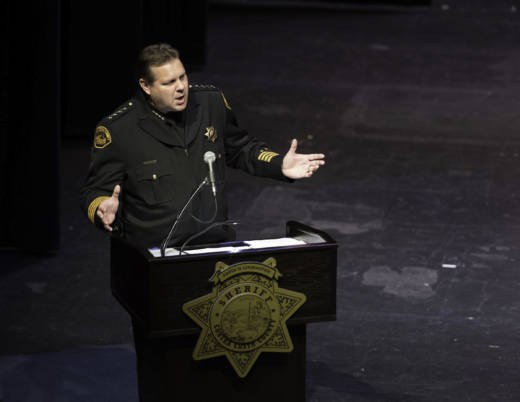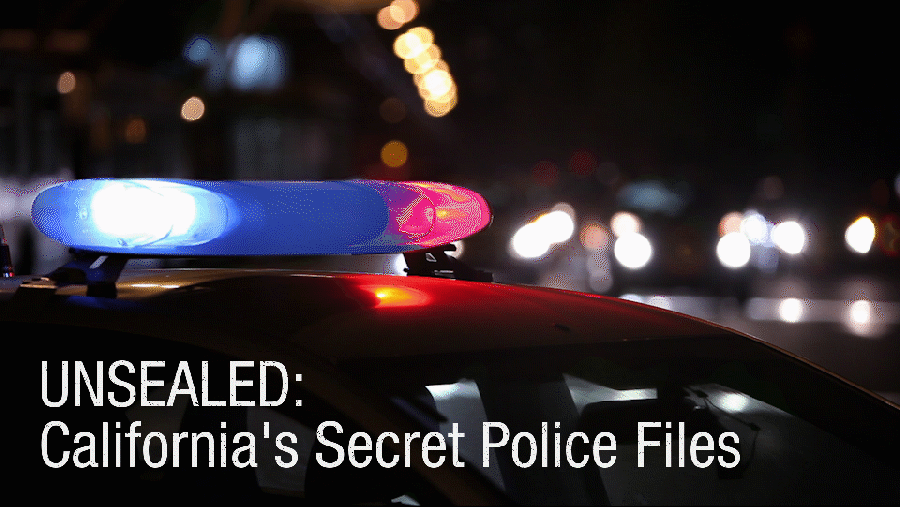The Contra Costa County sheriff is refusing to release all records of deputy misconduct under the state’s new police transparency law, claiming that his agency has “hundreds” of voluminous files and preparing them for public eyes is a burden he cannot meet.
Contra Costa County Sheriff Balks at Releasing Misconduct Records, Says 'Hundreds of Files' Need Review

In a letter to KQED and the Bay Area News Group on Wednesday, Sheriff David Livingston wrote that it would be “a monumental task” to find, review and release internal records of police dishonesty, sexual assault and use of force involving his deputies for the past five years.
The deputies patrol unincorporated portions of the county, serve as the local police in several communities that contract for their services, staff jails and provide security in court houses, among other duties.
“In order to fulfill your request, our office would need to conduct a lengthy and difficult manual review of hundreds of files, many each hundreds of pages in size,” Livingston, who is also a lawyer, wrote. That, he added, “is entirely unreasonable.”
But Livingston did release on Thursday records pertaining to a single officer-involved shooting in 2016 requested by someone else, apparently because that request was specific to that incident.
No other law enforcement agency in Northern California has outright rejected a request for five years of records citing the reasons listed by Livingston. Agencies with many more sworn officers, such as the California Highway Patrol, Department of Corrections and Rehabilitation and the Los Angeles Police Department have indicated they will release the information, or have already done so.
According to state data, the Contra Costa Sheriff’s Office had 643 sworn officers as of mid-December. Alameda County had 942, Santa Clara Countyh had 1,492 and the San Francisco sheriff had 835. Those agencies are either producing records or said they would produce records in the coming weeks.
But Livingston called requests filed by the Bay Area News Group and KQED on Jan. 1 an undue burden that creates “expense and inconvenience” for his staff. He similarly rejected requests from at least two others this week.
The new law, Senate Bill 1421, requires law enforcement agencies to release internal investigatory records on officer-involved shootings, use of force that caused serious injury or death, dishonesty by officers and sexual assault.
The law's author, state Sen. Nancy Skinner, who represents western Contra Costa County, took issue with the sheriff's position.
“Law enforcement agencies up and down the state have been releasing records under SB 1421, just as the law requires. The First District Court of Appeals has also now ruled that records, regardless of when they were created, should be released,” Skinner wrote in an emailed response. “So the Contra Costa County Sheriff’s Office claim that responding to a reasonable records request is too burdensome is simply a defiance of state law.”
An open-government advocate who also requested records from Livingston said the sheriff's reasons for keeping the records secret “doesn’t pass the smell test.”
There are exemptions in the law that allow agencies to reject requests for being overly burdensome, David Snyder, executive director of the First Amendment Coalition, said Thursday. But there appears to be nothing “unique about the Contra Costa sheriff” that makes a five-year request a problem, he added.
Livingston didn’t respond on Thursday to a request for an interview.
The sheriffs of Sacramento and Solano counties, who were claiming they wouldn’t release disciplinary records until courts ruled on the new law, changed their position this week and said they will provide records. Sacramento Sheriff Scott Jones had denied requests claiming the new law did not apply to old records and was sued by the Sacramento Bee and Los Angles Times. But Jones agreed to provide records this week, as did another holdout, Sonoma County Sheriff Mark Essick.
The union representing the Contra Costa County deputy sheriffs sued to block the release of records in January, claiming the new law didn’t apply to records created before Jan. 1. Unions for five other police departments in the county filed similar lawsuits but lost the case before Judge Charles Treat.
Treat ruled Feb. 8 that the law applied to any records in possession of a law enforcement agency regardless of when they were created, a position take by at least six other judges around the state. California's First District Court of Appeal published its brief decision last week rejecting a union’s appeal of Treat’s ruling, writing that the unions' argument is "without merit."
The Contra Costa sheriff’s office clearly has records that are releasable, according to news reports about deputies involved in shootings over the past five years.
In April 2018, Deputy Patrick Morseman was fired and charged with unlawful sex with an inmate at the West Contra Costa jail. The sheriff’s office has been subjected to several lawsuits alleging beatings and use-of-force incidents, including one dismissed last year in which the plaintiff alleged deputies assaulted him for being Muslim.
The single record released by Livingston on Thursday pertained to an investigation into a well-publicized fatal shooting of a Byron man by three deputies during a hostage situation.
In his rejection to providing a more complete response, Livingston invited those seeking records to ask for fewer documents and said he might reconsider. He also said he might provide documents for individual officers if asked for by name, but California’s 40-year history of keeping disciplined and fired officers’ names secret makes that extremely difficult.
Nate Gartrell of the Bay Area News Group and Alex Emslie of KQED News contributed to this report.
This story was produced as part of the California Reporting Project, a collaboration of 36 newsrooms across the state to obtain and report on police misconduct and serious use-of-force records unsealed in 2019.
